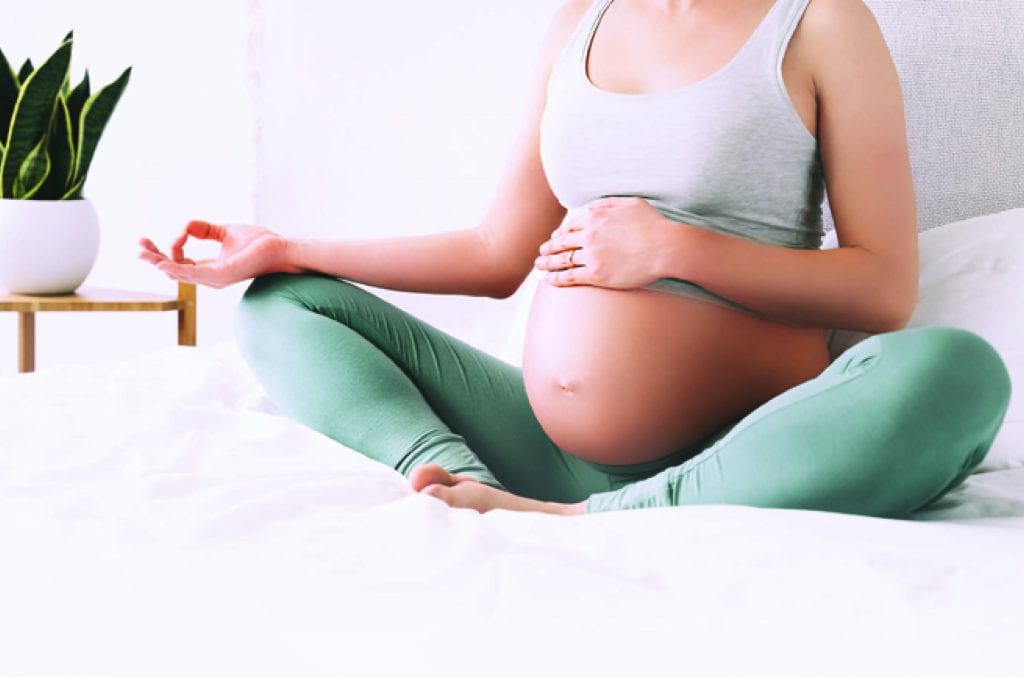Pregnancy presents both a mental and physical challenge for women. In general, what’s good for you when you’re not pregnant is what’s good for you when you are. Still, there are special considerations to take for your health during and after childbirth to best support your body and mind.
DURING PREGNANCY
body
Exercise is important even during pregnancy. If you’re healthy and your pregnancy is normal, the American College of of Obstetricians and Gynecologists (ACOG) recommends getting 150 minutes of moderate-intensity aerobic activity a week, which means you should be active enough to raise your heart rate and start sweating but not so much that you can’t speak normally. Staying active can help reduce back pain, ease constipation, promote healthy weight gain, and decrease the risk of complications like gestational diabetes, preeclampsia and cesarean delivery.
Safe exercises
- Walking: It offers a total body workout that is easy on your joints and muscles.
- Swimming and water workouts: You can work out muscles while the water helps you avoid strain and injury.
- Stationary cycling: Pregnancy can affect your balance, so riding a standard bicycle can be risky.
- Modified yoga or Pilates: Prenatal yoga and Pilates classes accommodate the shifts in balance that come with pregnancy. Make sure to avoid poses that require you to be still or lie on your back for long periods of time.
Activities to avoid
- Soccer, basketball and any other contact sports or activities that put you at risk of getting hit in the abdomen
- Activities with a high risk of a fall, such as skiing, gymnastics or horseback riding
- Hot yoga or Pilates
- Scuba diving
mind
Pregnancy is a time of joy, but it’s also a period of increased stress. Research suggests that 7% of women experience depression during pregnancy. Many of the symptoms, such as changes in sleep, energy level, appetite and libido can go unnoticed because they mirror changes that are already occurring. ACOG recommends depression and anxiety be screened for at least once as part of prenatal care, but if you suspect your negative feelings are caused by depression, don’t wait to consult your health care provider. They can help determine the next best steps.
Signs of depression during pregnancy
- Excessive anxiety
- Low self-esteem
- Disinterest in previously enjoyed activities
- Difficulty making decisions
- Resistance to following prenatal care instructions, including smoking, drinking or using illicit drugs
- Thoughts of suicide
Support your mental health
- Talk about about your feelings with your family, friends or health care provider.
- Try calming breathing exercises.
- Stay physically active—along with keeping your body healthy, it can improve mood.
- Eat regular meals and keep a healthy diet.
- Attend pregnancy classes to socialize with other pregnant people.
AFTER PREGNANCY
body
Exercise has many benefits following pregnancy. It helps strengthen abdominal muscles, boosts energy, promotes better sleep and can help prevent postpartum depression. Regular exercise also decreases the risk of deep vein thrombosis, a condition in which a blood clot forms in the legs or other part of the body that can occur in the weeks following childbirth.
Talk with your health care provider before resuming physical activity. For cesarean births or other complications, they may recommend a longer recovery period than with vaginal delivery. Like during pregnancy, ACOG recommends 150 minutes of moderate-intensity aerobic activity a week following childbirth. Aim to exercise for 20 to 30 minutes a day, but even 10 minutes will be beneficial. If you are breastfeeding, express your milk before you begin to avoid discomfort.
mind
From joy to fear, the birth of a child can trigger various emotions. Many women experience what is commonly known as the ‘baby blues,’ a period of depression and anxiety that occurs two or three days after delivery and lasts for one to two weeks. It is characterized by mood swings, crying and difficulty sleeping. Others experience a more severe, longer-lasting mood disorder known as postpartum depression. It can occur up to a year after delivery, and it is most common in the first one to three weeks following childbirth. If you or your family suspect you are suffering from postpartum depression, consult your health care professional immediately.
Causes of postpartum depression
- Hormone levels: Estrogen and progesterone decrease sharply following childbirth, and these changes can trigger depression.
- Mental health history: A history of depression, before or during the pregnancy, increases the risk of postpartum depression.
- Fatigue: It can take weeks to regain strength and energy following childbirth, and recovery can be even longer if there are complications.
- Emotional factors: Feelings of doubt, sadness, anger and guilt are not uncommon during pregnancy. These emotions can negatively impact self-esteem and how you handle stress.
- Lifestyle factors: Stressful life events or a lack of support following the baby’s arrival can increase the risk of postpartum depression.
Signs of postpartum depression
- Severe mood swings
- Excessive crying
- Difficulty bonding with your baby
- Social withdrawal
- Changes in appetite
- Changes in sleeping habits
- Fatigue
- Anger and irritability
- Anxiety and panic attacks
- Hopelessness
- Thoughts of harming yourself or your baby
Sources: The American College of Obstetricians and Gynecologists, Mayo Clinic
